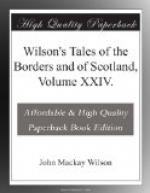Her father dead, Burde Olive fair—
Her mother’s image—grows apace,
And oft she throws in pensive care
A glance upon that crape-veiled face:
She wonders what may be beneath.
But fears to lift the veil to know;
Her father with his latest breath
Forbade it, on the pain of woe,
Till she to eighteen years had grown,
With woman’s wisdom duly fraught,
When she might take that picture down
And learn the lesson which it taught.
Yet as she sat within the bower
That bore a mother’s sacred name,
She felt the heart’s divining power
And guessed the face within the frame—
Her mother’s! who they said was dead:
And hence the crape—appropriate sign.
But why debarred the simple meed
To look upon her face divine,
And as she looked revive again
Those lines that had been once impressed
By love upon her infant brain,
And never thence to be defaced?
Not ever fairest painted theme,
Or triumph of the graver’s art,
Could match the image of her dream
Enshrined within a daughter’s heart—
So gently kind, so sweetly fair:
They were the features she assigned
To creatures of yon upper air
When they look down on humankind:
And oft she sighed that morn would shine
When that dark crape she could remove,
And she would feast those eydent eyne
On those that taught her first to love;
And oft she scanned her own sweet face,
Reflected to her anxious view,
To see if therein she could trace
Those lineaments—the first she knew.
VI.
On Time’s swift wing the years have passed:
The morn has come, the hour is now,
When she would feast her heart at last
By looking on that sacred brow!
She took the picture from the nail,
She held it in her trembling hands,
She lifted up the envious veil,—
And there confessed the mother stands.
The charm is wrought! that painted gleam
Brought up the lines impressed of yore,
As flash of the bright morning beam
On twilight things seen long before.
Her mother seemed from death returned;
She kissed the lips, the cheeks, the chin;
She sobbed, she sighed, she laughed—she
mourned
To think it was a painted sign;
And then at last she turned it round,
As if she feared her sire’s decree,
And there, in written words, she found
The dreaded curse of Dowielee:
THE CURSE.
“Than Olive who more beautiful
In all that nature could bestow?
Than Olive who more dutiful
When first she pledged that holy vow?
What is she now, by sin entoiled?
Dark spirits of yon woods declare,
Where I in anguish wander wild,
The victim of a dark despair.
“Thank Heaven, I leave no son my heir,
Who might another Olive see,
And think her as his mother fair—
Fair, but yet a mystery—
With heart so like some alcove deep,
Where nightingales may sing their song,
And roses blow, and—serpents creep,
To sting him as I have been stung.




